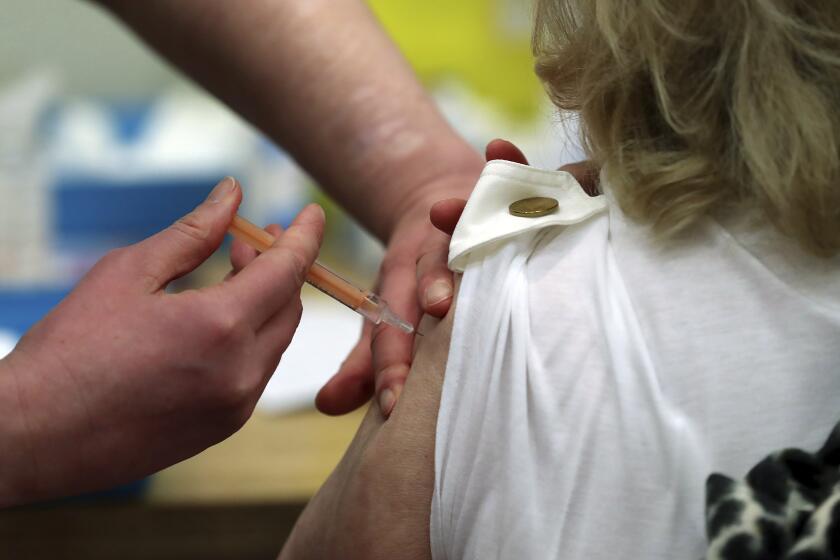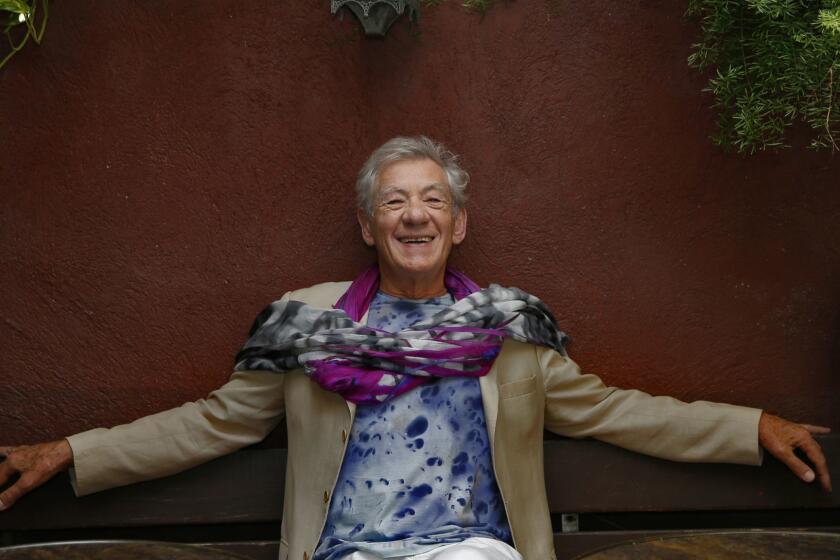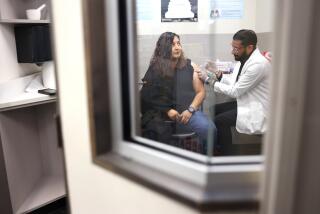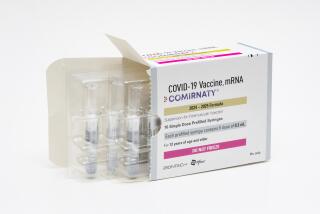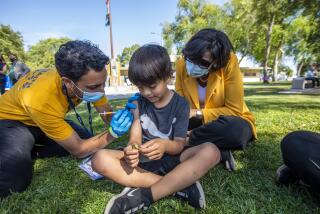All adults in Britain to get first COVID-19 shot by July 31, government says
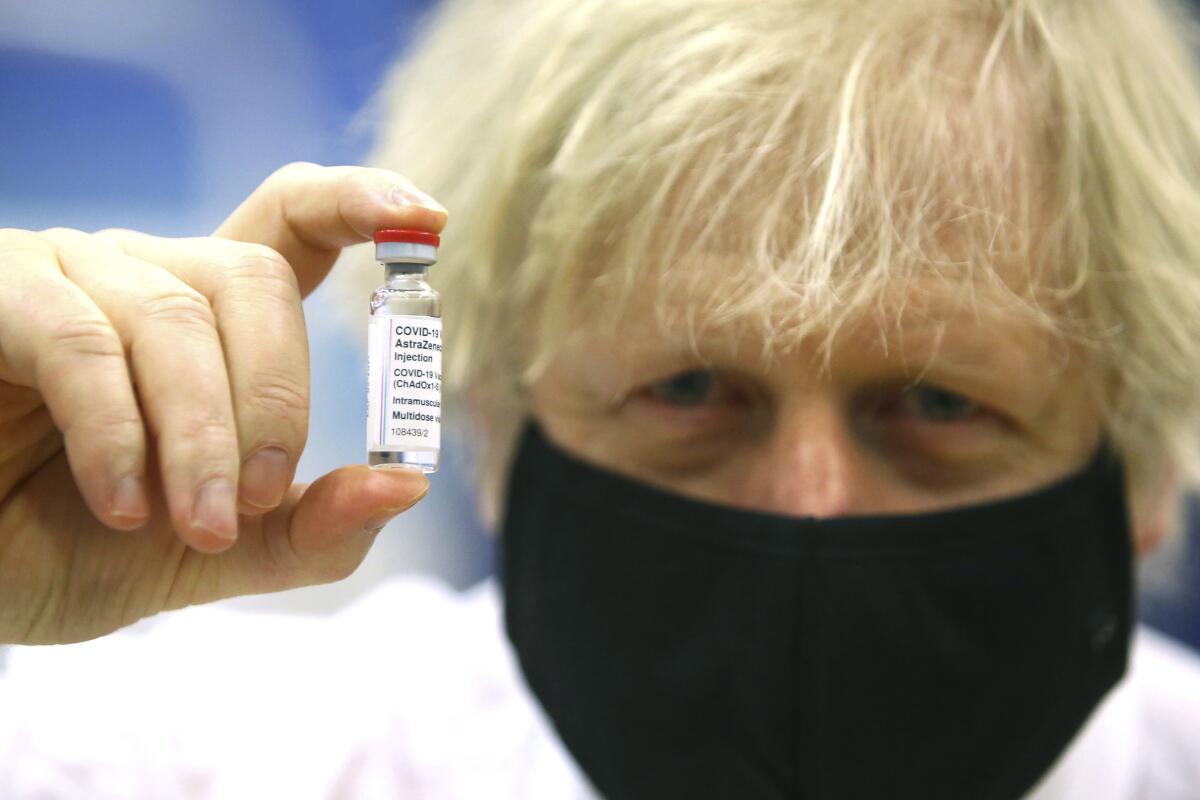
- Share via
LONDON — The British government is aiming to give every adult a COVID-19 vaccine shot by July 31 — at least a month earlier than its previous target — as it prepares to set out a “cautious” plan to ease the country’s coronavirus lockdown.
The previous aim was for all adults to get at least a first dose of a COVID-19 inoculation by September. The accelerated schedule now calls for everyone 50 and over and those with underlying health conditions to get the first of their two vaccine shots by April 15, rather than the previous target date of May 1, and all adults by the end of July.
The makers of the two COVID-19 vaccines that Britain is using, Pfizer and AstraZeneca, have both experienced supply problems in Europe. But British Health Secretary Matt Hancock said Sunday that “we now think that we have the supplies” to speed up the U.K.’s vaccination campaign.
The early success of Britain’s vaccination effort is welcome news for a country that has had more than 120,000 coronavirus deaths, the highest toll in Europe. More than 17.5 million people, a third of U.K. adults, have had at lease one vaccine shot since immunizations began Dec. 8.
Britain is delaying giving second vaccine doses until 12 weeks after the first, rather than three to four weeks, in order to give more people partial protection quickly. The approach has been criticized in some countries — and by Pfizer, which says it does not have any data to support the longer interval — but it is backed by the British government’s scientific advisors.
News of the new vaccine targets came as Prime Minister Boris Johnson met Sunday with senior ministers to finalize a “road map” out of the national lockdown. He is expected to announce the details in Parliament on Monday.
British scientists are going to test whether different COVID-19 vaccines can be mixed and matched.
Faced with a dominant virus strain that scientists say is both more transmissible and more lethal than the original coronavirus, Britain has spent much of the winter under tight public restrictions. Bars, restaurants, gyms, schools, hair salons and all nonessential shops have been closed; grocery stories, pharmacies and takeout food venues are still open.
The government has stressed that economic and social reopening will be slow and cautious, with nonessential shopping or outdoor socializing unlikely before April. Many children will go back to school beginning March 8; nursing home residents will be able to have one visitor starting from that date as well.
Johnson’s Conservative government has been accused of reopening the country too quickly after the first lockdown in the spring. The number of new confirmed cases, hospitalizations and deaths are all declining in February but remain high, and Johnson says his reopening road map will follow “data, not dates.”
But he is under pressure from some Conservative lawmakers, who argue that restrictions should be lifted quickly to revive an economy that has been hammered by three lockdowns in the last year.
After his first dose, actor Ian McKellen encouraged others to get the COVID-19 vaccine: “We all have a part to play in the fight against coronavirus.”
John Edmunds, a member of the government’s scientific advisory group, said British hospitals were still treating almost 20,000 COVID-19 patients, half the January peak but almost as many as at the height of the first coronavirus surge last spring.
“If we eased off very rapidly now, we would get another surge in hospitalizations” and deaths, he told the BBC.
Edmunds said there was added uncertainty because of new virus variants, including one identified in South Africa that may be more resistant to current vaccines.
Hancock told Sky News that the government would take a “cautious but irreversible approach” to reopening the economy.
Despite the success of Europe’s fastest vaccination campaign, the British government has been accused of failing to protect disabled people, who are among the most at risk from COVID-19.
The Office for National Statistics has found that 60% of people who died with coronavirus in England in 2020 had a physical or mental disability. But many disabled people, apart from those with “severe or profound” learning disabilities, have not been put in a priority group for vaccination.
Jo Whiley, a well-known BBC radio DJ, highlighted the plight of her 53-year-old sister Frances, who has a learning disability. Whiley said Sunday that her sister contracted COVID-19 in an outbreak at her care home, whose residents had not been vaccinated.
Whiley said her sister had finally been offered a shot of vaccine — but it came too late.
“She was actually called in for her vaccine last night. My mum got a message to say that she could get vaccinated, but it’s too late — she’s fighting for her life” in the hospital, Whiley told the BBC. “It couldn’t be crueler.”
More to Read
Sign up for Essential California
The most important California stories and recommendations in your inbox every morning.
You may occasionally receive promotional content from the Los Angeles Times.
